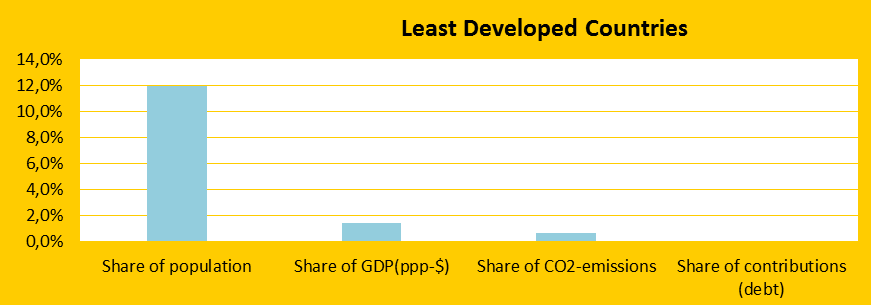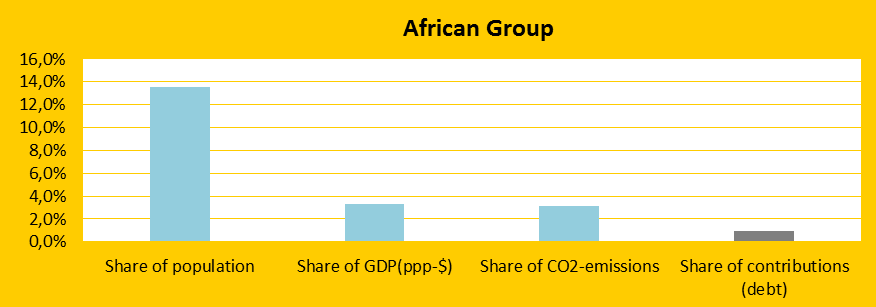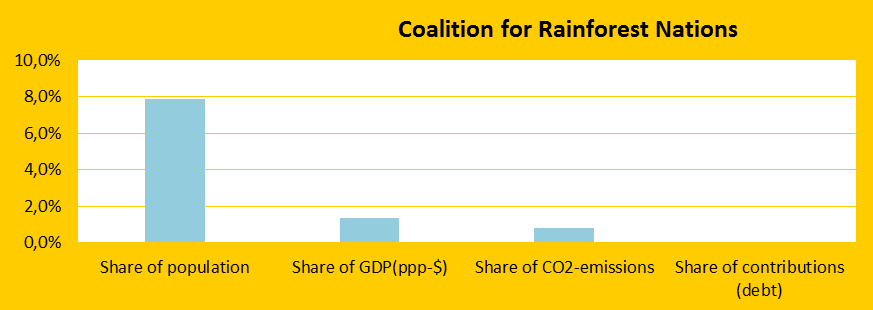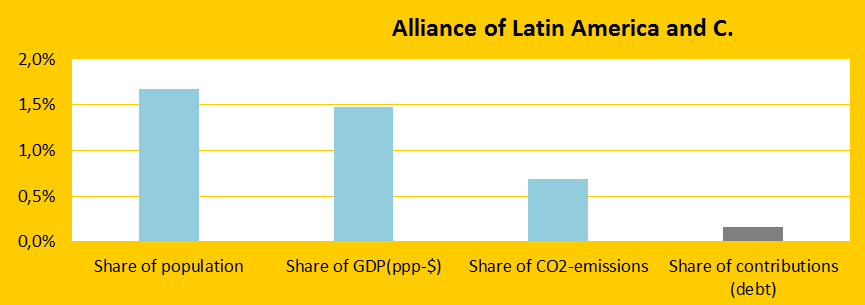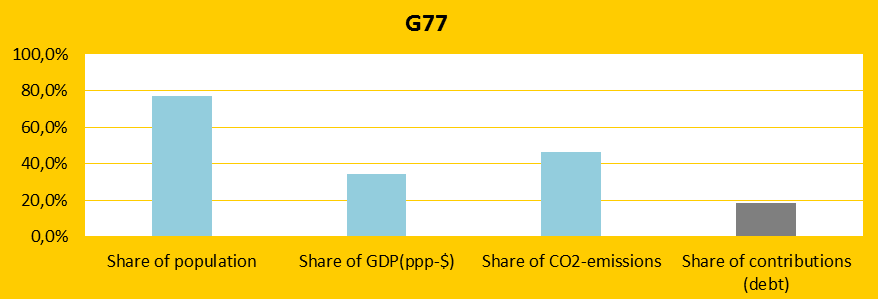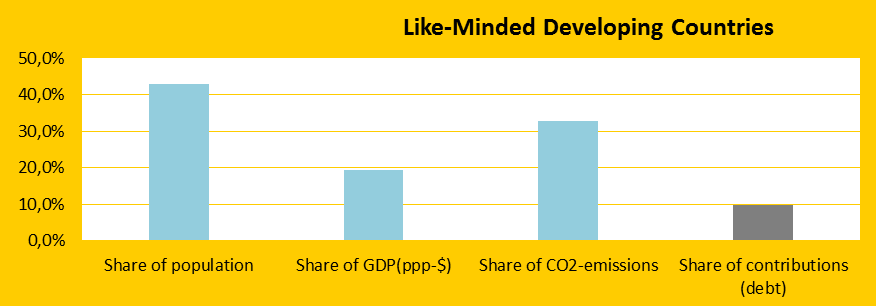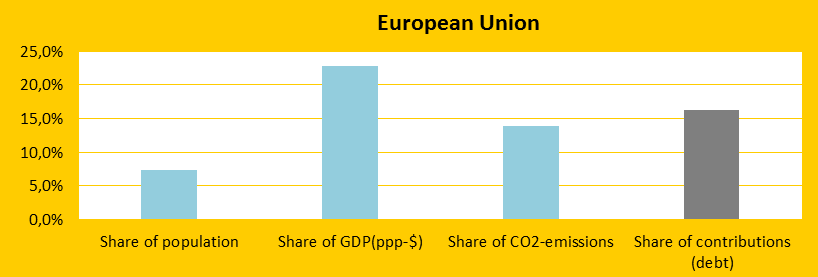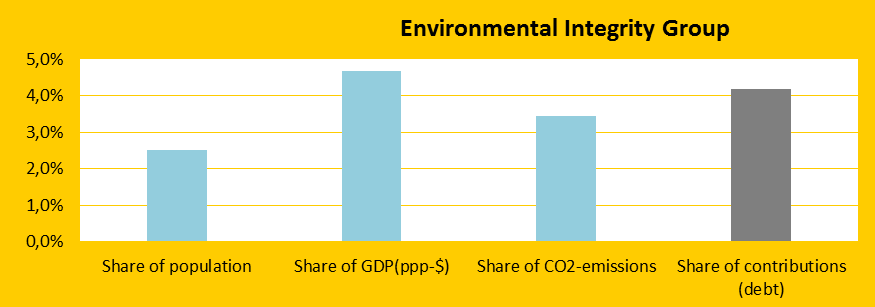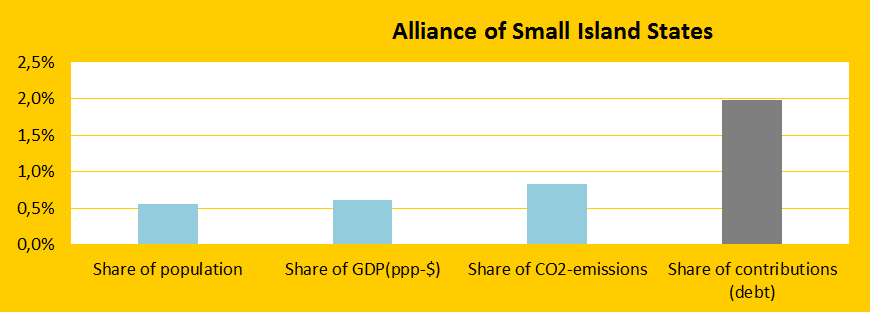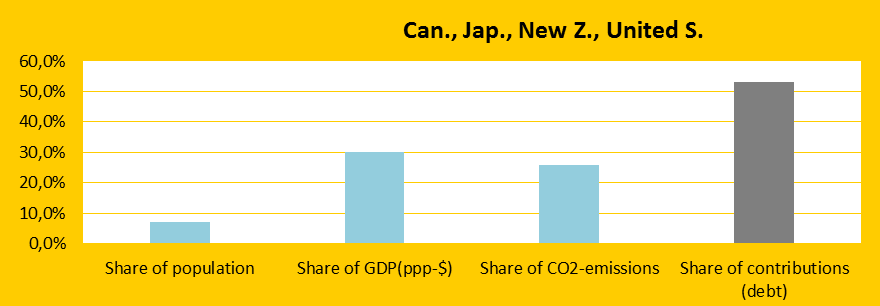Country groups and positions at COP19

2013
The negotiation process during COP19 in Warsaw in November 2013 was frustrating and largely fruitless and the following organizations and movements withdrew from the climate conference in protest: ‘Aksyon Klima Pilipinas‘, ‘ActionAid‘, ‘Bolivian Platform on Climate Change‘, ‘Construyendo Puentes‘ (Latin America), ‘Friends of the Earth‘ (Europe), ‘Greenpeace‘, ‘Ibon International‘, ‘International Trade Union Confederation‘, ‘LDC Watch‘, ‘Oxfam International‘, ‘Pan African Climate Justice Alliance‘, ‘Peoples’ Movement on Climate Change‘ (Philippines) and ‘WWF‘.
First step to understanding the inherent conflicts of interest in the COP process would be to examine the nature of the COP country groups (submission groups) – a detailed study of the complex negotiating proces is another matter.
1) Least Developed Countries Group (48 countries)
Afghanistan, Angola (69), Bangladesh, Benin, Bhutan, Burkina Faso, Burundi, Cambodia, Central African, Chad, Comoros, Dem. Rep. Congo, Djibouti, Equatorial Guinea, Eritrea, Ethiopia, Gambia, Timor-Leste, Guinea, Togo, Guinea-Bissau, Tuvalu, Haiti, Uganda, Kiribati, Tanzania, Laos, Madagascar, Malawi, Mali, Mauritania, Mozambique, Myanmar, Nepal, Niger, Rwanda, Samoa, Sao Tome and Principe, Solomon Islands, Somalia, Sudan, Vanuatu, Lesotho, Senegal, Sierra Leone, Yemen, Liberia and Zambia.
- The brackets show the ranking on the list of the worst performing countries in ClimatePositions 2010 (only the countries with climate debt). The countries in light grey lacked data and they are not included in the diagrams included in each section.
- The diagrams after each section show the country group’s total share of the global 1) Population, 2) GDP(ppp-$), 3) CO2 emissions (2006-2010) and 4) Contributions (climate debt in ClimatePositions 2010).
This country group (submission group) is homogeneous in this context and without responsibility for the ongoing climate disaster. Speaking with one voice makes perfect sense. Read the submissions here: ‘LDC-1‘, ‘LDC-2‘, ‘LDC-3‘, ‘LDC-4‘.
Submission quotes:
- “A voluntary, non-binding pledge and review regime is unable to deliver what is required by science to address the climate change challenge and could lead towards a 4°C warming world.”
- “A rule-based legally binding regime, designed to implement collectively agreed commitments, based on latest available science, is by far the most favourable to address climate change. However, such a regime can be undermined even when a single Party, in particular if it is a key player, withdraws its contribution from the global effort.”
According to ClimatePositions 2010 a fair share of the Global Climate Change Financing for the countries included in this country group (submission group) would be 0.01% = $0.41 billion out of $2,834 billion.
2) African Group (55 countries)
Algeria (79), Angola (69), Benin, Botswana (64), Burkina Faso, Burundi, Cameroon, Cape Verde, Central African Republic, Chad, Comoros, Congo (Braz.), Dem. Rep. Congo, Cote d’Ivoire, Djibouti, Egypt, Equatorial Guinea, Eritrea, Ethiopia, Gabon, Gambia, Ghana, Guinea, Guinea Bissau, Kenya, Lesotho, Liberia, Libya (35), Madagascar, Malawi, Mali, Mauritania, Mauritius (44), Morocco, Mozambique, Namibia (77), Niger, Nigeria, Rwanda, Senegal, Seychelles, Sierra Leone, Somalia, South Africa (39), South Sudan, Sudan, Swaziland, São Tomé and Príncipe, Tanzania, Togo, Tunisia (75), Uganda, Western Sahara, Zambia and Zimbabwe.
This country group is not fully homogeneous since 35 countries are contribution free and 8 are not. See the global shares in the diagram below and read the submissions here: ‘AFR-1‘, ‘AFR-2‘.
Submission quotes:
- ”Record of commitments by all Parties in accordance with their national circumstances and common but differentiated responsibilities and respective capabilities, in an ex ante, with commitments covering mitigation, adaptation, finance and technology support; where commitments will be internationally assessed for adequacy against the principle based reference framework.”
- “The Group recognises that the legal outcome will be under the Convention, conforming with principles and provisions of the Convention, in particular historical responsibility, equity and common but differentiated responsibilities and respective capabilities, respect.”
According to ClimatePositions 2010 a fair share of the Global Climate Change Financing for the countries included in this country group would be 0.95% = $27 billion out of $2,834 billion.
3) Coalition for Rainforest Nations (19 countries)
Bangladesh, Belize, Chad, Cote d’Ivoire, Dem. Rep. Congo, Dominica, Dominican Republic (67), Fiji, Gabon, Guyana, Honduras (76), Kenya, Liberia, Nigeria, Panama (54), Papua New Guinea, Congo (Braz.), Sierra Leone and Uganda.
This country group is relatively homogeneous although the forest cover varies from 85% in Gabon to 6% in Kenya. 12 countries are contribution free and 3 are not (all with low rankings). Speaking with one voice makes sense (with a critical eye on Panama’s CO2 emissions). See the global shares in the diagram below and read the submission here: ‘RFN-1‘.
Submission quotes:
- “The Coalition includes a vast majority rainforest countries covering the three largest tropical forest areas in the world and other important nations. We believe that adequate and sustainable financial resources to implement REDD+ should be urgently provided to rainforest countries.”
- “Provide guidance and advice on matters related with reducing emissions from deforestation and forest degradation in developing countries, and the role of conservation, sustainable management of forests and enhancement of forest carbon stocks in developing countries to multilateral initiatives, bilateral efforts, civil society, rural communities, the private sector, etc.” (by establishing a Committee/Board).”
According to ClimatePositions 2010 a fair share of the Global Climate Change Financing for the countries included in this country group would be 0.04% = $1.12 billion out of $2,834 billion.
4) Alliance of Latin America and Caribbean (6 countries)
Chile (45), Colombia, Costa Rica, Guatemala (82), Panama (54) and Peru.
This country group is relatively homogeneous. 3 countries are contribution free and 3 are not. Speaking with one voice is not without dilemmas due to Chile’s and Panama’s large CO2 emissions. See the global shares in the diagram below and read the submission here: ‘LILAC-1‘.
Submission quotes:
- ”Adaptation is central to the Convention because we have so far failed to effectively address anthropogenic climate change, and the impacts are already being felt around the world. Future scenarios pose daunting threats to development gains everywhere.”
- “Sufficient funding is and will be needed for all phases of adaptation actions and efforts. Funding, and more generally means of implementation including technology transfer and capacity building, will need to be provided by Parties who are able to do so.”
According to ClimatePositions 2010 a fair share of the Global Climate Change Financing for the countries included in this country group would be 0.16% = $1.51 billion out of $2,834 billion.
5) Group 77 (133 countries)
Afghanistan, Algeria (79), Angola (69), Antigua and Barbuda, Argentina (53), Bahamas, Bahrain, Bangladesh, Barbados, Belize, Benin, Bhutan, Bolivia (80), Bosnia and Herzegovina (50), Botswana (64), Brazil (63), Brunei Darussalam, Burkina Faso, Burundi, Cambodia, Cameroon, Cape Verde, Central African Republic, Chad, Chile (45), China (57), Colombia, Comoros, Congo (Braz.), Costa Rica, Côte d’Ivoire, Cuba, North Korea, Dem. Rep. Congo, Djibouti, Dominica, Dominican Republic (67), Ecuador (68), Egypt (72), El Salvador, Equatorial Guinea, Eritrea, Ethiopia, Fiji, Gabon, Gambia, Ghana, Grenada, Guatemala (82), Guinea, Guinea-Bissau, Guyana, Haiti, Honduras (76), India, Indonesia (73), Iran (40), Iraq (71), Jamaica (59), Jordan (66), Kenya, Kiribati, Kuwait (3), Laos, Lebanon (52), Lesotho, Liberia, Libya (35), Madagascar, Malawi, Malaysia (38), Maldives, Mali, Marshall Islands, Mauritania, Mauritius (44), Micronesia, Mongolia, Morocco, Mozambique, Myanmar, Namibia (77), Nauru, Nepal, Nicaragua, Niger, Nigeria, Oman (11), Pakistan, Panama (54), Papua New Guinea, Paraguay, Peru, Philippines, Qatar (1), Rwanda, Saint Kitts and Nevis, Saint Lucia, Saint Vincent and the Grenadines, Samoa, Sao Tome and Principe, Saudi Arabia (12), Senegal, Seychelles, Sierra Leone, Singapore (2), Solomon Islands, Somalia, South Africa (39), Sri Lanka, Palestine, Sudan, Suriname, Swaziland, Syria (78), Tajikistan, Thailand (56), Timor-Leste, Togo, Tonga, Trinidad and Tobago (5), Tunisia (75), Turkmenistan (36), Uganda, United Arab Emirates (4), Tanzania, Uruguay (74), Vanuatu, Venezuela (43), Vietnam, Yemen, Zambia, Zimbabwe.
96 of the countries are included in the diagram below and 57 of these countries were contribution free in ClimatePositions 2010. The remaining 39 countries include number 1, 2, 3, 4, 5, 11, 12 on the list of the worst performing countries and the country group is heterogeneous to the extreme. Speaking with one voice is meaningless unless specific binding problem-solving proposals are presented, with significant co-financing within the group. Read the submissions here: ‘G77-1‘, ‘G77-2‘ and ‘G77-3‘.
Submission quotes:
- ”Also recalling that Parties should protect the climate system for the benefit of present and future generations of humankind, on the basis of equity and in accordance with their common but differentiated responsibilities and respective capabilites, and should take precautionary measures to anticipate, prevent or minimize the causes of climate change and mitigate its adverse effects.”
- ”Stressing the urgent need for developed country Parties to provide scaled-up, adequate, sustainable, predictable, new and additional support, mainly from public sources, to developing countries to allow their participation in the global effort to hold the increase of the global average temperature below 2 degrees Celsius, both in relation to adaptation and mitigation.”
- ”Acknowledges the pledges made by some developed country Parties and urges all developed country Parties to announce pledges on the provision of financial resources for 2014 and thereafter.”
According to ClimatePositions 2010 a fair share of the Global Climate Change Financing for the countries included in this country group would be 18.36% = $520 billion out of $2,834 billion.
6) Like-Minded Developing Countries (13 countries)
Bolivia (80), China (57), Cuba, Ecuador (68), Egypt (72), India, Mali, Malaysia (38), Nicaragua, Philippines, Saudi Arabia (12), Thailand (56) and Venezuela (43).
4 of the countries were contribution free in ClimatePositions 2010 and 8 were not. Saudi Arabia stands out as one of the worst performing countries in the world. The country group is very heterogeneous and speaking with one voice is meaningless unless specific binding problem-solving proposals are presented, with co-financing within the group. Read the submission here: ‘LMDC-1‘.
Submission quotes:
- ”Although the world has changed in a number of ways during the past two decades, the historical responsibilities of developed countries for causing climate change remain unchanged. Social and economic developments and poverty eradication are still the first and overriding priorities of developing countries. The differentiation between developed and developing countries should be maintained. Therefore, it is still of great significance and necessity that developed countries demonstrate their leadership in combating climate change.”
- ”Current research on climate change action gaps show that enhanced ambition on adaptation, finance, technology transfer and capacity building are even more needed. As such the range of actions for enhanced ambition pre-2020 should holistically include adaptation, finance, technology transfer and support and capacity building.”
According to ClimatePositions 2010 a fair share of the Global Climate Change Financing for the countries included in this country group would be 9.73% = $276 billion out of $2,834 billion.
7) European Union (28 countries)
Austria (17), Belgium (10), Bulgaria (48), Croatia (42), Cyprus, Czech Republic (29), Denmark (33), Estonia (21), Finland (16), France (26), Germany 24), Greece (22), Hungary (47), Ireland (13), Italy (28), Latvia (62), Lithuania (65), Luxembourg, Malta, Netherlands (9), Poland (46), Portugal (34), Romania, Slovakia (41), Slovenia (25), Spain (23), Sweden (30) and United Kingdom (27).
This country group is relatively homogeneous and only Romania is contribution free. Speaking with one voice makes sense. Read the submissions here (often with support from Albania, Bosnia and Herzegovina, Iceland, Macedonia, Montenegro and Serbia): ‘EU-1‘, ‘EU-2‘, ‘EU-3‘, ‘EU-4‘, ‘EU-5‘, ‘EU-6‘, ‘EU-7‘, ‘EU-8‘, ‘EU-9‘.
Submission quotes:
- ”we all made a decisive commitment to work towards a single, fair and comprehensive legally binding agreement under the Convention that is applicable to all Parties.”
- ”the 2015 Agreement should aim to address 100% of global greenhouse gas emissions.”
- “Parties opting to use international market-based mechanisms to comply with their commitments.”
- ”Member States’ fast start contributions are voluntary and not based on any distribution key. They do not prejudge any burden sharing for future global climate financing.”
According to ClimatePositions 2010 a fair share of the Global Climate Change Financing for the countries included in this country group would be 16.21% = $459 billion out of $2,834 billion.
8) Environmental Integrity Group (5 countries)
Liechtenstein, Mexico (51), Monaco, South Korea (15) and Switzerland (32).
This country group is relatively homogeneous. Speaking with one voice makes sense. Read the submission here: ‘EIG-1‘.
Submission quotes:
- ”A dynamic and flexible framework for the participation of all Parties is necessary for allowing increase of ambition and development in differentiation reflecting the changing economic realities, national circumstances, common but differentiated responsibilities and respective capabilities.”
- ”Differentiation between all Parties according to the principles of the Convention is necessary to ensure fairness and equity in Parties’ commitments, including incentives to foster greater action where there is major potential are key.”
According to ClimatePositions 2010 a fair share of the Global Climate Change Financing for the countries included in this country group would be 4.19% = $119 billion out of $2,834 billion.
9) Alliance of Small Island States (39 countries)
Antigua and Barbuda, Bahamas, Barbados, Belize, Cape Verde, Comoros, Cook Islands, Cuba, Dominica, Dominican Republic (67), Fiji, Fed. St. of Micronesia, Grenada, Guinea-Bissau, Guyana, Haiti, Jamaica (59), Kiribati, Maldives, Marshall Islands, Mauritius (44), Nauru, Niue, Palau, Papua New Guinea, Samoa, Singapore (2), Seychelles, Sao Tome and Principe, Solomon Islands, St. Kitts and Nevis, St. Lucia, St. Vincent and the Grenadines, Suriname, Timor-Leste, Tonga, Trinidad and Tobago (5), Tuvalu and Vanuatu.
Only 7 out of the 39 countries (many small islands) are included in ClimatePositions 2010 (note that 30 of the islands in average has increased CO2 emissions from 3.8 tons per capita in the 1990s to 5.9 tons in 2011). The country group is heterogeneous to the extreme and speaking with one voice is meaningless unless specific binding problem-solving proposals are presented, with significant co-financing within the group. Singapore and Trinidad and Tobago stand out as some of the worst performing countries in the world. Read the submissions here: ‘AOSIS-1‘, ‘AOSIS-2‘, ‘AOSIS-3‘, ‘AOSIS-4‘.
Submission quote:
- “Also reaffirming that the Fund will play a key role in channeling new, additional, adequate and predictable financial resources to developing countries and will catalyze climate finance, both public and private, and at the international and national levels. Reiterating that a significant share of new multilateral funding for adaptation should flow through the Green Climate Fund.”
According to ClimatePositions 2010 a fair share of the Global Climate Change Financing for the countries included (only 7) in this country group would be 1.98% = $56 billion out of $2,834 billion.
10) Four Developed Countries (4 countries)
Canada (8), Japan (18), New Zealand (19) and United States (7).
This country group is homogeneous and with a burdensome responsibility for the ongoing climate disaster. Speaking with one voice makes perfect sense. Read the submissions here (one is including Australia): ‘DVC-1 (with Aus.)‘, ‘DVC-2‘, ‘DVC-3‘, ‘DVC-4‘.
Submission quotes:
- ”Enabling environments will be a key determinant of these flows, which provide the necessary “pull” factor to attract the right kinds of investments, and which will underpin any realistic pathways for mobilizing scaled-upclimate finance. Sound enabling environments will give the private sector the confidence needed to make climate-friendly investments.”
- ”It would also be useful to explore how clear and transparent Nationally Appropriate Mitigation Actions (NAMAs) and commitments have been successful in stimulating scaled up private investments from domestic and international sources.”
- ”We also need to learn from their experiences on how we can make climate-related investments more attractive and identify gaps and opportunities for replication of successful projects and business models.”
According to ClimatePositions 2010 a fair share of the Global Climate Change Financing for the countries included in this country group would be 53.12% = $1,505 billion out of $2,834 billion.
Information on national GDP(ppp-$) per capita: Worldbank (links in the menu “Calculations”).
Source on CO2 emissions: EIA, U.S. Energy Information Administration (links in the menu “Calculations”).
Data on national and global populations: EIA, U.S. Energy Information Administration (links in the menu “Calculations”).
Two sites with more information including national COP19 submissions: ‘United Nations, Framework Convention on Climate Change‘ (UNFCCC) and ‘The Adopt a Negotiator Project‘.
Drawing by Claus Andersen, 2013.
Comments are closed.
